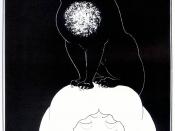In Edgar Allan Poe?s most famous short story "The Tell-Tale Heart" (1843) Poe gives a psychological portrait of a mad narrator who recounts his murder of an old man. "The Tell-Tale Heart" is merely a "tale of conscience," in which Poe exposes the dark side of humankind by giving this short story a psychological thrill. The narrator or madman in this story tells the story in first- person, therefore, the reader can not determine how much of what he says is true. Although the narrator repeatedly states that he is sane, the reader suspects otherwise because of his bizarre reasoning, behavior, and speech. Psychotic reasoning, psychotic illusions, and psychotic behavior are three causes in the story that lead up to the effect and that also prove the narrator?s insanity.
Psychotic reasoning or thinking of the narrator is one of the significant causes of the murder in "The Tell-Tale Heart."
The narrator speaks with alarm in the first line of the story: "True-nervous-very, very dreadfully nervous I had been and am; but why will you say that I am mad?" (1). Therefore, the narrator expounds at once that he suffers from a disease, but he only implies that because it has not dulled his senses. Through Poe?s description of the narrator?s state of mind in the beginning of the story, the reader soon realizes that the narrator has in fact plunged into madness. The narrator?s stated purpose is not a confession, but the hunger to prove his sanity. In trying to prove this, Poe writes the narrator speaking "I heard all things in the heaven and in the earth. I heard many things in hell. How, then, am I mad? Hearken! And observe how healthily?how calmly I can tell you the whole story" (1). The narrator speaks of...


